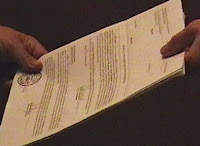 In addition to the other great legal titles we have at our library, I found one book as I was browsing through our library collection that caught my attention. Called No Constitutional Right to be Ladies: women and the obligations of citizenship by Linda K. Kerber, it caught my interest because most times the only books that keep my attention are treatises or court cases - and, as it turns out, this book has all that, in spades!
In addition to the other great legal titles we have at our library, I found one book as I was browsing through our library collection that caught my attention. Called No Constitutional Right to be Ladies: women and the obligations of citizenship by Linda K. Kerber, it caught my interest because most times the only books that keep my attention are treatises or court cases - and, as it turns out, this book has all that, in spades!
Historically, women were treated little more than property and were held out to be genteel and tender creatures who couldn't own property, couldn't hold office, and couldn't keep their own name after marriage. They were to be cared for and coddled.
The problem with this (as suggested in the book) is that this is a two-edged sword. On the one hand, society wants to protect women from stubbing toes and skinning their knees and on the flip side, women want to be treated like a person - equal pay for equal work.
Problem is, you can't have it both ways; you're either genteel or you're a ditch digger. What Kerber does is take the reader on a historical ride from pre-Revolutionary War, to slavery, to the modern era. "Ladies" emphasizes the need for women (or any under-represented group) to choose what they want; if they choose the rights prescribed under the U.S. Constitution, they should also be willing to abide by all the consequences of that decision (i.e. full citizenship).
The problem with this (as suggested in the book) is that this is a two-edged sword. On the one hand, society wants to protect women from stubbing toes and skinning their knees and on the flip side, women want to be treated like a person - equal pay for equal work.
Problem is, you can't have it both ways; you're either genteel or you're a ditch digger. What Kerber does is take the reader on a historical ride from pre-Revolutionary War, to slavery, to the modern era. "Ladies" emphasizes the need for women (or any under-represented group) to choose what they want; if they choose the rights prescribed under the U.S. Constitution, they should also be willing to abide by all the consequences of that decision (i.e. full citizenship).
While there were several items that stuck out in this book like discrimination in the selective service process and women and jury service, the one area that held my attention was the fight for women's suffrage in Chapter 3. In the fight to give women the right to vote, the concept of taxation was tied to the obligation and right to vote. On page 96, Keber quoted Charles Sumner, stating "In a state of nature no man can take any property from me without my consent. If he does, he deprives me of my liberty and makes me a slave.
What is important to note is that at the time of this argument, the issue of slavery hung heavy in the political air and what the suffrage movement was trying to do was to compare the fact that not being able to vote was the same as being a slave. As it turned out, Sumner's statement was a compelling argument and one which further helped pave the way for women's right to vote.
What is important to note is that at the time of this argument, the issue of slavery hung heavy in the political air and what the suffrage movement was trying to do was to compare the fact that not being able to vote was the same as being a slave. As it turned out, Sumner's statement was a compelling argument and one which further helped pave the way for women's right to vote.
Begging for a good read? Tired of all the sickly soap opera novels floating around? Need something new for your book club? Then take a gander at No Constitutional Right to be Ladies: women and the obligations of citizenship by Linda K. Kerber and blow your book club away!




